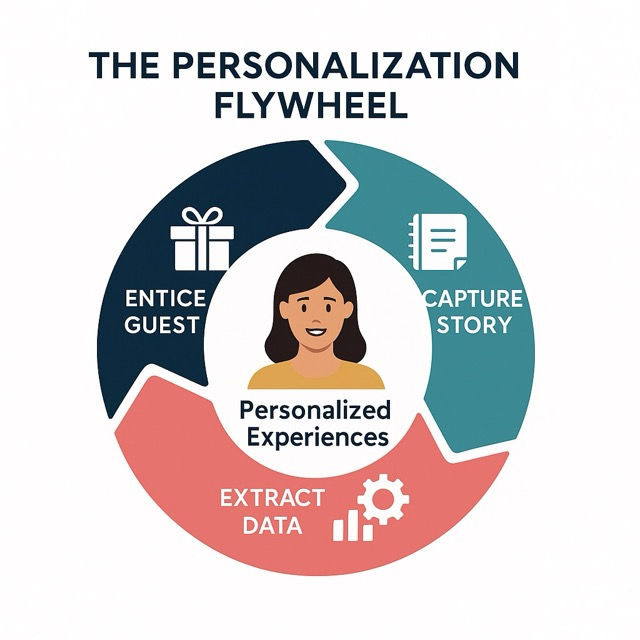AI Personalization for the Hospitality Industry
- David Hajdu

- Jul 27, 2025
- 5 min read
Updated: Sep 11, 2025
In the hospitality industry, the difference between a satisfied guest and a loyal advocate often comes down to one thing: personalization. A recent study found that 71% of travelers expect personalized experiences, yet only 20% of hotels have embraced AI-driven personalization despite proven revenue gains of up to 30%. This disconnect represents both a challenge and an unprecedented opportunity.
Guests today don't just desire personalized experiences; they demand them. Exceptional hospitality has become synonymous with uniquely tailored services, where every touchpoint feels crafted specifically for the individual guest. However, while the aspiration is clear, the path to delivering such hyper-personalization at scale remains elusive for most hospitality brands.
This brings us face-to-face with a paradox: to provide personalized experiences, businesses need detailed information about each guest. Yet, guests will only willingly share personal information if they perceive immediate and meaningful value. This catch-22 has become the central challenge for the hospitality industry in the age of data-driven personalization.

Breaking the Catch-22 with the AI Personalization Flywheel
To overcome this paradox, successful hospitality leaders embrace what I call the AI Personalization Flywheel. The flywheel operates on three essential stages: Entice, Capture, Extract. When executed effectively, this continuous loop generates increasingly precise data, enabling hyper-personalization powered by artificial intelligence.
Let’s dive deeper into how each stage of the flywheel operates and how it collectively unlocks significant revenue growth, enhanced guest satisfaction, and competitive market advantage.

Stage 1: Entice – Incentivizing Guests to Share Information
The first and perhaps most critical step in activating the AI Personalization Flywheel is enticing guests to willingly provide their data. Without incentives, guests are understandably hesitant to share personal preferences, details, or experiences. Yet when presented with tangible, relevant benefits, guests become eager participants in their own hospitality experience.
According to a seminal Cornell Hospitality Quarterly study titled "Increasing Hotel Loyalty through Psychological Ownership" (March 2025), even seemingly minor opportunities for personalization significantly enhance guest satisfaction and loyalty. When guests select their preferred room layouts, snack bar offerings, or pillow softness, they experience psychological ownership over their stay, leading to a measurable increase in positive sentiment and brand loyalty.
The key is making these incentives visible, intuitive, and effortless. Hotels can achieve this through simple digital interfaces, AI-powered concierge interactions, or thoughtful pre-stay communications. Such incentives become the initial catalyst, drawing guests into the flywheel and kickstarting a beneficial data exchange.
Stage 2: Capture – Seamlessly Gathering Rich, Relevant Data
After guests are suitably enticed, hospitality providers must then capture their information efficiently and unobtrusively. Data capture should be frictionless, integrated seamlessly into the guest experience rather than a standalone task.
Hospitality brands can deploy interactive touchpoints such as mobile apps, smart room technologies, voice-activated assistants, or digital guest profiles. Guests naturally share details about their preferences, habits, and experiences as part of interacting with these intuitive interfaces.
As I frequently emphasize at the AI Officer Institute:
“AI is 99% accurate if you give it the right data and prompt it the right way.”
Thus, capturing the right data is a pivotal stage. It ensures accuracy and lays the foundation for meaningful insights. Each piece of information collected enriches the understanding of individual guest preferences, allowing for increasingly nuanced personalization in subsequent interactions.
Stage 3: Extract – Transforming Raw Data into Actionable Insights
While collecting data is vital, the raw information alone offers limited value. Hospitality leaders must employ sophisticated AI tools and analytics to transform this raw data into actionable insights. Techniques like Natural Language Processing (NLP), sentiment analysis, predictive analytics, and machine learning algorithms systematically analyze guest behaviors, preferences, and feedback.
The extraction process reveals hidden patterns and predictive indicators. For example, AI might identify that guests who request extra towels and prefer specific dietary choices also tend to appreciate recommendations for wellness experiences. Such insights enable hotels to proactively offer tailored packages, thus enhancing satisfaction and incremental revenue.
The extracted insights become the engine driving hyper-personalized interactions, empowering hospitality staff and automated systems to anticipate and respond to guest needs with impressive precision.
Turning Insights into Personalized Guest Experiences
Once data is extracted and structured, hospitality providers can fully leverage AI’s capabilities to deliver individualized guest experiences. Personalized room settings, targeted dining recommendations, tailored upselling opportunities, and dynamic pricing based on guest profiles exemplify tangible outcomes of effective personalization.
According to the Journal of Hospitality Management study "The Personalization Gap in Hospitality" (January 2025), while AI-driven personalization boosts hotel revenue by as much as 30%, only 20% of hotels have fully implemented these capabilities. The remaining 80% leave substantial revenue and competitive advantage untapped.
Personalization efforts, however, are not limited to just operational touchpoints. They influence emotional connections, ensuring guests feel seen, understood, and valued. This emotional resonance is a key driver of long-term loyalty, turning occasional guests into brand ambassadors.
Continuous Improvement: The Power of the Flywheel
The beauty of the AI Personalization Flywheel lies in its continuous, self-reinforcing nature. Each successful personalized interaction further entices guests to share more information, providing additional data to capture and insights to extract. This iterative loop compounds over time, continually refining personalization accuracy and guest experience quality.
As Jeff Bezos famously articulated, customer obsession is paramount:
“We see our customers as invited guests to a party, and we are the hosts. It’s our job every day to make every important aspect of the customer experience better.”
In hospitality, the ability to anticipate and satisfy guest needs even before they articulate them represents the epitome of customer obsession.
Strategic Imperatives for Hospitality Leaders
Adopting the AI Personalization Flywheel is more than an operational upgrade, it's a strategic transformation. It requires hospitality leaders to rethink the way they interact with guests, structure their organizations, and deploy technologies. Leaders must embrace AI not merely as a tool but as a central pillar of their business strategy.
Integrating the flywheel into hospitality operations entails significant change management, employee training, investment in advanced technologies, and, importantly, a cultural shift toward data-driven decision-making. Those who succeed will position themselves as industry pioneers, achieving exceptional growth, enduring guest loyalty, and formidable market differentiation.
Those who delay or resist this transition risk falling further behind, struggling with diminishing guest loyalty, decreased revenue performance, and eventual market obsolescence.
Conclusion: Unlocking Hospitality’s Future
The hospitality industry stands at a critical inflection point. AI-driven hyper-personalization is no longer just a trend, it’s a fundamental necessity. The AI Personalization Flywheel offers a clear roadmap for hospitality leaders seeking to break through the personalization paradox and create unmatched guest experiences.
Through deliberate implementation of the flywheel, Entice, Capture, Extract, hospitality brands can continuously deepen their understanding of guests, enhance experiences at every interaction, and drive unprecedented revenue growth.
Those who embrace this transformative approach will not only thrive today but redefine the standard for hospitality excellence tomorrow.



Comments